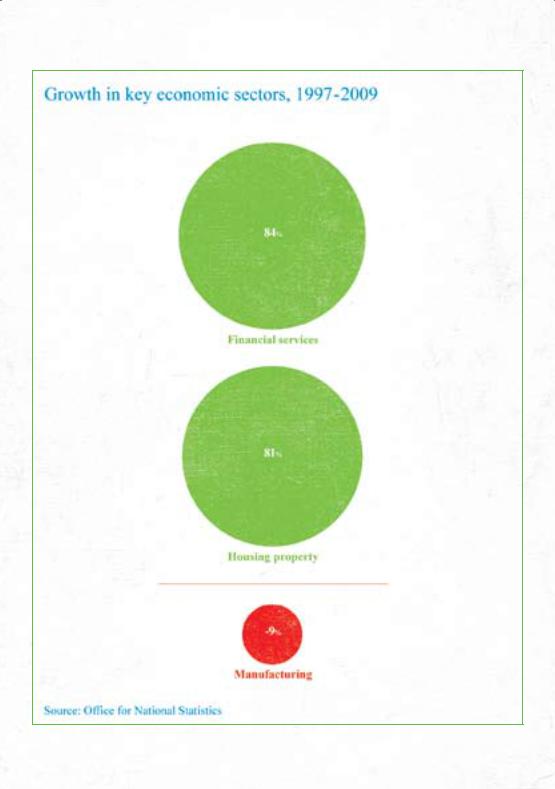
Программа Консерваторов
.pdf
10

change the economy | create a more balanced economy
Create a more balanced economy
We will create the conditions for higher exports, business investment and saving as a share of GDP.
For the last decade, growth has been too dependent on government spending and debtfuelled consumption. More than half of the new jobs created were driven by public spending.
Household savings collapsed, and the UK has the lowest investment as a share of GDP of any G7 country. Our share of world exports has fallen by almost a third. A sustainable recovery must be driven by growth in exports and business investment, and through a better environment for wealth creation.
Make Britain the leading hi-tech exporter in Europe
We will implement key recommendations from Sir James Dyson’s Review into how to achieve our goal of making Britain Europe’s leading hi-tech exporter, including:
•encouraging the establishment of joint university-business research and development institutes;
•initiating a multi-year Science and Research Budget to provide a stable investment climate for Research Councils;
•creating a better focus on Science, Technology, Engineering and Maths
(STEM) subjects in schools; and,
•establishing a new prize for engineering.
Research and development tax credits will be improved and refocused on hi-tech companies, small businesses and new start-ups. At the same time, we will give strong backing to the growth industries that generate high-quality jobs around the country.
We will improve the performance of UK
Trade and Investment with a renewed focus on high priority sectors and markets where the return on taxpayers’ money is highest. We will regularly compare government support for exporters and inward investment against the services provided by our competitors. We will work for the successful conclusion of the Doha trade round and support bilateral free trade
negotiations between the European Union (EU) and other countries.
11

change the economy | create a more balanced economy
Encourage saving and investment
Only by saving more can we finance investment for the future without being dependent on unsustainable inflows of capital from abroad. We will help stop the spread of means-testing by restoring the link between the basic state pension and average earnings, making it worthwhile for people to save. Other measures we will take to encourage saving include:
•reinvigorating occupational pensions and working with employers and industry to support auto-enrolment into pensions;
•working with the trade unions, businesses and others to address the growing disparity between public sector pensions and private sector pensions, while protecting accrued rights; and,
•when resources allow, starting to reverse the effects of the abolition of the dividend tax credit for pension funds.
We will reward those who have saved for their retirement by ending the effective obligation to buy an annuity at age 75. And we will raise the inheritance tax threshold to £1 million to help millions of people who aspire to pass something on to their children, paid for by a simple flat-rate levy on all non-domiciled individuals.
We must not let the mis-selling of financial products put people off saving. We will implement the Ombudsman’s recommendation to make fair and transparent payments to Equitable Life policy holders, through an independent payment scheme, for their relative loss as a consequence of regulatory failure.
Help households manage their debts
Going into the recession, Britain’s consumer debt was the highest in the G7. A Conservative government will promote responsible consumer finance by creating a powerful Consumer Protection Agency (CPA) to take over the
Financial Services Authority’s consumer protection role. In addition, we will:
•give the CPA new powers to define and ban excessive borrowing rates on store cards;
•launch Britain’s first free national financial advice service, funded in full through a new social responsibility levy on the financial services sector;
•introduce a seven-day cooling off period for store cards;
•require credit card companies to provide clear information; and,
•ensure that no-one is forced to sell their home to pay unsecured debts of less than £25,000.
12

13

Debbie Scott
“I’ve always believed that we’ll only solve our big social and economic problems if we all get involved and try and make a difference. It’s never enough just to sit back and think ‘well the government can take care of it’ – I think we’ve all got a responsibility to do what we can. That’s why every day, my colleagues and I use all the innovation and flexibility we can muster to help those furthest from the labour market to overcome their personal barriers to work. For me, it is all about believing in the power of people. Tomorrow’s People welcomes the concept of the single Work Programme – it pulls everything together and allows organisations like ours to support people more effectively on their individual journey from welfare into work.”
Debbie Scott is the Chief Executive of Tomorrow’s People, a national employment charity founded in 1984

change the economy | get britain working again
Get Britain working again
We will reduce youth unemployment and reduce the number of children in workless households as part of our strategy for tackling poverty and inequality.
Under Labour, youth unemployment has reached over 900,000, with one in five young people unable to find a job. We are at risk of creating a lost generation of young people without the skills to participate in the workforce, without hope for the future. At the same time, economic inactivity is rising, and more than five million people are out of work and on benefits.
This tidal wave of worklessness is making it hard for many families to make ends meet. In recent years, the number of people living in severe poverty has risen. One in six children in the UK now lives in a workless household – the highest proportion of any country in Europe – and child poverty has gone up in recent years. Getting people back into work is an essential part of realising the goal of eliminating child poverty by 2020, and ensuring that everyone benefits from economic growth.
Reduce welfare dependency
We will scrap Labour’s failing employment schemes and create a single Work Programme for everyone who is unemployed, including the 2.6 million people claiming Incapacity
Benefit who do not get enough help from existing programmes. We will reassess all current claimants of Incapacity Benefit.
Those found fit for work will be transferred onto Jobseeker’s Allowance. Recipients of
Incapacity Benefit who are genuinely disabled will continue to receive the financial support to which they are entitled. Our Work Programme will:
•offer people targeted, personalised help sooner – straight away for those with serious barriers to work and at six months for those aged under 25;
•be delivered through private and voluntary sector providers, which will be rewarded on a payment by results basis for getting people into sustainable work;
•draw on a range of Service Academies to offer pre-employment training for unemployed people – our first Service
Academy, for hospitality and leisure, will provide up to 50,000 training places and work placements; and,
15

change the economy | get britain working again
•involve the development of local Work Clubs – places where people looking for work can gather together to exchange skills, find opportunities, make useful contacts and provide mutual support.
Our plans will give unemployed people a hand up, not a hand out. Unemployed people must be prepared to take up job offers. So, with the
Conservatives, long-term benefit claimants who fail to find work will be required to ‘work for the dole’ on community work programmes. Anyone on Jobseeker’s Allowance who refuses to join the Work Programme will lose the right to claim out-of-work benefits until they do, while people who refuse to accept reasonable job offers could forfeit their benefits for up to three years. This will create a welfare system that is fair but firm.
Boost small business
In the end, it is not the state that creates sustainable employment – it is business people. And small businesses are especially important to the UK’s economic recovery and to tackling unemployment. Government can help boost enterprise by lowering tax rates, reducing regulation and improving workers’ skills.
As well as stopping Labour’s jobs tax, for the first two years of a Conservative government any new business will pay no Employers
National Insurance on the first ten employees it hires during its first year.
To support small businesses further, we will:
•make small business rate relief automatic; and,
•aim to deliver 25 per cent of government research and procurement contracts through SMEs by cutting the administrative costs of bidding.
We will support would-be entrepreneurs through a new programme – Work for Yourself
– which will give unemployed people direct access to business mentors and substantial loans. We need to make work pay, so we will keep the minimum wage and work to reduce the very high marginal tax rates faced by many people on low incomes who want to return to work or increase their earnings. We will look at how to abolish the default retirement age, as many older people want to carry on working. And we will force equal pay audits on any company found to be discriminating on the basis of gender.
Improve skills and strengthen higher education
Developing economies are able to provide highly-skilled work at a fraction of the cost of British labour. The only way we can compete is by dramatically improving the skills of Britain’s workforce, yet thousands of young people leave school every year without the skills they need to get a good
16

change the economy | get britain working again
job. A Conservative government will not accept another generation being consigned to an uncertain future of worklessness and dependency.
We will promote fair access to universities, the professions, and good jobs for young people from all backgrounds. We will use funding that currently supports Labour’s ineffective employment and training schemes, such as Train2Gain, to provide our own help for people looking to improve their skills. This will allow us to:
•create 400,000 work pairing, apprenticeship, college and training places over two years;
•give SMEs a £2,000 bonus for every apprentice they hire;
•establish a Community Learning Fund to help people restart their careers; and,
•create a new all-age careers service so that everyone can access the advice they need.
To meet the skills challenge we face, the training sector needs to be given the freedom to innovate. We will set colleges free from direct state control and abolish many of the further education quangos Labour have put in place. Public funding will follow the choices of students and be delivered by a single agency, the Further Education Funding Council.
Universities contribute enormously to the economy. But not all of this contribution comes directly – it can come from fundamental research with no immediate application – and universities also have a crucial cultural role. We will ensure that Britain’s universities enjoy the freedom to pursue academic excellence and focus on raising the quality of the student experience. To enable this to happen, we will:
•delay the implementation of the Research
Excellence Framework so that it can be reviewed – because of doubts about whether there is a robust and acceptable way of measuring the impact of all research;
•consider carefully the results of Lord Browne’s review into the future of higher education funding, so that we can unlock the potential of universities to transform our economy, to enrich students’ lives through teaching of the highest quality, and to advance scholarship; and,
•provide 10,000 extra university places this year, paid for by giving graduates incentives to pay back their student loans early on an entirely voluntary basis.
17

Silicon Valley
Despite having a population twenty times smaller than the UK, Silicon Valley is a global beacon for innovation and enterprise, attracting more venture capital investment than the whole of the UK. Having led the internet revolution, Silicon Valley is now becoming a world leader in green technology development. These successes are thanks to the highly skilled workforce and world-class universities, the ease of starting a business, and the availability of credit and investment. In addition, companies in Silicon Valley have been able to attract employees in a highly competitive labour market by introducing measures to improve the general well-being of their staff, including flexible working and childcare facilities.

change the economy | Encourage enterprise
Encourage enterprise
We will improve Britain’s international rankings for tax competitiveness and business regulation.
Thirteen years ago, Britain’s tax system was one of the most competitive in the developed world. Over the last decade, other countries have cut their tax rates while our tax system has become one of the most complex in the world.
Our competitiveness rating has fallen, while the burden of regulation and the impact of taxation have risen. We can only make a sustainable economic recovery if we send a clear signal that Britain is open for business again. That means stopping Labour’s jobs tax, lowering corporate tax rates, reducing the regulatory burden,
and supporting innovation and sustainable development – changes that will benefit businesses of all sizes and boost employment.
Cut and simplify business taxes
The Conservative Party believes in lower and simpler taxation. That is why we will ensure that by far the largest part of the burden of dealing with the deficit falls on lower spending rather than higher taxes. Cutting the deficit is the most urgent task we need to undertake if we are to get the economy moving, but it is not enough. So, initially, we will cut the headline rate of corporation tax to 25p and the small companies’ rate to 20p, funded by reducing complex reliefs and allowances.
Over time, we hope to reduce these rates further. Our ambition is to create the most competitive tax system in the G20 within five years.
We will restore the tax system’s reputation for simplicity, stability and predictability. In our first Budget, we will set out a five year road map for the direction of corporate tax reform, providing greater certainty and stability to businesses. We will create an independent
Office of Tax Simplification to suggest reforms to the tax system.
We will take a series of measures to encourage
Foreign Direct Investment into the UK, including:
•making the UK a more attractive location for multinationals by simplifying the complex
Controlled Foreign Companies rules;
•consulting on moving towards a territorial corporate tax system that only taxes profits generated in the UK; and,
•creating an attractive tax environment for intellectual property.
19
